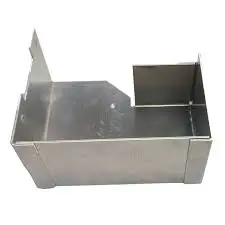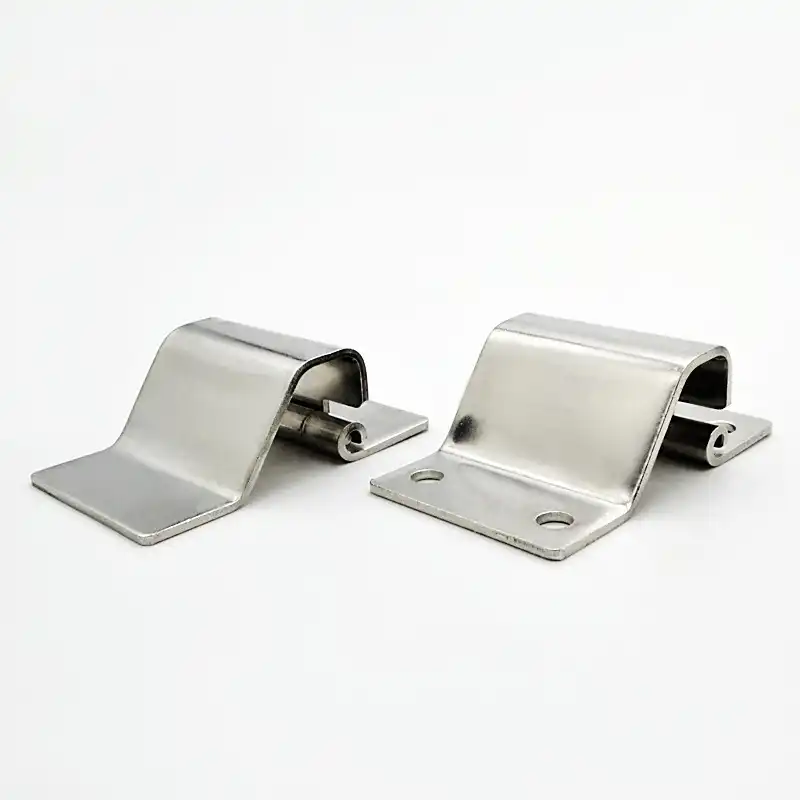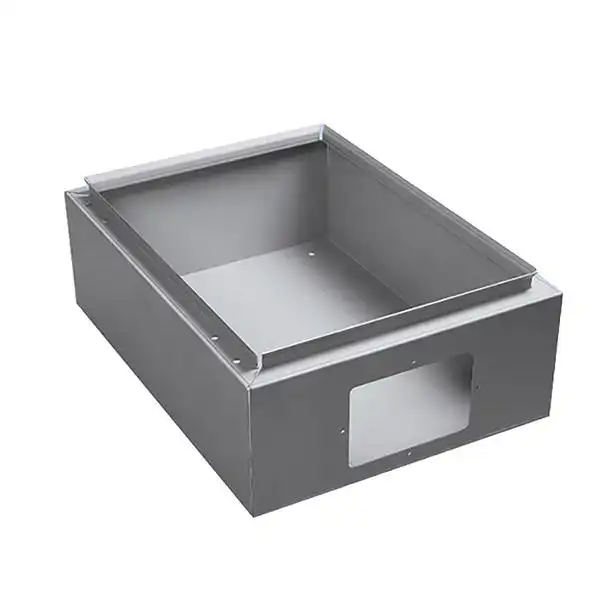What Materials Are Commonly Used in Fabricating Small Sheet Metal Boxes?
2025-07-08 15:05:48
In the world of precision manufacturing, small sheet metal boxes play a crucial role across numerous industries, from electronics to telecommunications and beyond. These compact enclosures provide protection, organization, and functionality for various components and systems. The selection of appropriate materials for fabricating small sheet metal boxes is fundamental to ensuring their performance, durability, and cost-effectiveness. This comprehensive guide explores the diverse range of materials commonly employed in the fabrication of small sheet metal boxes, examining their unique properties, applications, and advantages.When considering materials for the product fabrication, manufacturers typically rely on several primary options including aluminum, stainless steel, mild steel, copper, and brass. Each material brings distinct characteristics that make it suitable for specific applications. The small sheet metal box industry has evolved significantly, with companies like RUIRUI offering precision manufacturing using various materials finished through processes such as anodizing, powder coating, or brushed treatment. These boxes can be customized in different colors including red, grey, black, or other specified shades to meet diverse client requirements.

Primary Materials for Small Sheet Metal Box Fabrication
Aluminum and Aluminum Alloys
Aluminum stands as one of the most popular materials for manufacturing small sheet metal boxes due to its exceptional combination of properties. With an excellent strength-to-weight ratio, aluminum provides robust protection while maintaining lightweight characteristics that are crucial in applications where weight considerations are paramount. The natural corrosion resistance of aluminum makes it ideal for small sheet metal boxes exposed to moisture or varying environmental conditions, eliminating the need for additional protective treatments in many cases.Furthermore, aluminum's superior thermal conductivity allows it to effectively dissipate heat, making it an excellent choice for the products housing electronic components that generate significant thermal energy during operation. This property helps prevent overheating and extends the lifespan of enclosed components. Aluminum's excellent formability permits complex designs and precise detailing in small sheet metal box fabrication, enabling manufacturers like RUIRUI to create customized solutions that perfectly match client specifications. The material's natural aesthetic appeal, which can be enhanced through treatments like anodizing, results in small sheet metal boxes that combine functionality with sophisticated appearance.
Stainless Steel Varieties
Stainless steel represents the gold standard for durability and resilience in small sheet metal box manufacturing. Its outstanding corrosion resistance, attributable to the chromium content forming a passive oxide layer, makes it ideal for small sheet metal boxes deployed in harsh environments or exposed to corrosive substances. This material maintains its integrity and appearance over extended periods, ensuring long-term reliability for critical applications.The exceptional strength and impact resistance of stainless steel provide superior protection for sensitive contents housed within small sheet metal boxes, making it particularly suitable for industrial settings where physical impacts may occur. Different grades of stainless steel offer varying levels of corrosion resistance and mechanical properties, allowing manufacturers to select the most appropriate option for specific small sheet metal box applications. Grade 304, for instance, offers excellent general-purpose properties, while grade 316 provides enhanced corrosion resistance for more demanding environments. The professional finish and premium appearance of stainless steel small sheet metal boxes make them popular choices for applications where visual appeal matters alongside functional requirements, such as in medical devices or high-end electronic equipment.
Carbon and Mild Steel Options
Carbon and mild steel represent cost-effective solutions for the product fabrication where extreme conditions are not a concern. The high strength and structural integrity of these materials ensure reliable protection for enclosed components at a more accessible price point compared to stainless steel or specialized alloys. RUIRUI utilizes various steel types including cold-rolled steel and coated steel for different small sheet metal box applications based on specific client requirements.These materials offer excellent magnetic properties, making them suitable for small sheet metal boxes that require magnetic shielding or mounting capabilities. The versatility of carbon and mild steel allows for various surface treatments and coatings to enhance corrosion resistance and appearance, including powder coating, zinc plating, or electrophoresis. The widespread availability and established processing techniques for these materials result in shorter production times and more cost-effective manufacturing for small sheet metal boxes, particularly in large-volume production scenarios. Additionally, mild steel's good weldability and formability make it ideal for creating complex small sheet metal box designs with strong, reliable joints and precise dimensioning.
Specialized Materials for Enhanced Performance
Copper and Brass Applications
Copper and brass offer unique properties that make them invaluable for specialized small sheet metal box applications. Their outstanding electrical conductivity makes these materials excellent choices for small sheet metal boxes requiring electromagnetic interference (EMI) shielding, protecting sensitive electronic components from external electrical noise. This characteristic is particularly important in telecommunications equipment and precision instruments housed in the products.The inherent antimicrobial properties of copper make it an excellent material for small sheet metal boxes used in medical and healthcare settings, where controlling bacterial growth is essential. Research has demonstrated copper's ability to kill bacteria and viruses on contact surfaces, adding a dimension of functionality beyond mere containment. The distinctive aesthetic appeal of copper and brass small sheet metal boxes, which can be enhanced through various finishes and treatments, makes them popular for applications where visual appearance is as important as functional performance. The natural patina that develops on these materials over time creates a unique, evolving appearance that many designers and end-users find attractive in specialized small sheet metal box applications.
Galvanized and Coated Steels
Galvanized and coated steels represent economical solutions for enhancing the performance of steel-based small sheet metal boxes. The zinc coating applied during galvanization creates a sacrificial barrier that corrodes preferentially to the underlying steel, significantly extending the lifespan of small sheet metal boxes exposed to moisture or corrosive environments. This makes galvanized steel an excellent choice for outdoor or high-humidity installations.Various coating types, including zinc, aluminum-zinc alloys, and polymer coatings, provide different levels of protection and performance characteristics for the products. The coating selection depends on the specific environmental challenges the small sheet metal box will face during its service life. These coated materials combine the structural advantages of steel with enhanced durability at a lower cost than stainless steel, offering an optimal balance of performance and economy for many small sheet metal box applications. Additionally, powder coating options available through manufacturers like RUIRUI allow for customized colors and textures while providing additional corrosion protection and aesthetic enhancement for small sheet metal boxes.
Exotic and Specialty Metals
For the most demanding applications, exotic and specialty metals provide exceptional performance characteristics for the products. Titanium offers an unparalleled strength-to-weight ratio and corrosion resistance, making it ideal for small sheet metal boxes used in aerospace, marine, or chemical processing applications where exposure to extreme environments is expected. The material's biocompatibility also makes it suitable for medical device enclosures.High-temperature alloys such as Inconel or Hastelloy enable the creation of small sheet metal boxes capable of withstanding extreme thermal conditions while maintaining structural integrity. These specialized materials find applications in industrial equipment, automotive components, and other high-temperature settings. Despite their higher cost compared to conventional materials, these specialty metals deliver exceptional value through extended service life and reliable performance in the most challenging conditions. The investment in premium materials for small sheet metal boxes often results in reduced maintenance requirements and fewer replacements over time, providing long-term cost benefits for critical applications.

Selection Criteria and Considerations
Performance Requirements Analysis
Selecting the optimal material for small sheet metal box fabrication begins with a thorough analysis of performance requirements. Environmental exposure conditions—including temperature extremes, humidity levels, chemical exposure, and UV radiation—significantly influence material selection for small sheet metal boxes. Manufacturers must evaluate whether the intended environment demands the corrosion resistance of stainless steel or if aluminum's lighter weight would provide adequate protection while reducing overall weight.Mechanical requirements, including load-bearing capacity, impact resistance, and vibration dampening, must be carefully assessed when choosing materials for the products. Applications involving frequent handling or risk of physical impact may necessitate stronger materials or reinforced designs. Additionally, thermal management considerations play a crucial role in material selection for small sheet metal boxes housing electronic components, with aluminum often preferred for its superior heat dissipation properties. RUIRUI's expertise in various manufacturing processes allows them to recommend optimal material choices based on comprehensive performance analysis for each small sheet metal box project, ensuring the final product meets or exceeds all operational requirements.
Cost-Benefit Evaluation
Material selection for small sheet metal boxes inevitably involves balancing performance requirements with budget constraints. Initial material costs vary significantly—with aluminum and mild steel typically offering more economical options compared to stainless steel or specialty alloys. However, a comprehensive cost analysis must consider the entire lifecycle of the small sheet metal box, including maintenance requirements and expected service life.While stainless steel small sheet metal boxes may have higher upfront costs, their superior durability and minimal maintenance requirements often result in lower long-term expenses compared to options requiring regular replacement or refinishing. Production volume also influences material selection economics, as certain materials may offer cost advantages in large-scale manufacturing of standardized small sheet metal boxes, while others may be more suitable for low-volume, specialized applications. RUIRUI's experience across various production scales enables them to provide cost-effective material recommendations while maintaining the quality and performance standards required for each small sheet metal box project.
Manufacturing Process Compatibility
The compatibility between selected materials and available manufacturing processes significantly impacts the feasibility and quality of small sheet metal box production. Different materials exhibit varying levels of formability, affecting their suitability for complex small sheet metal box designs requiring precise bends, folds, or drawn sections. RUIRUI's expertise in progressive stamping, deep drawing stamping, and single process stamping allows them to work effectively with a wide range of materials for the product fabrication.Joining methods—including welding, riveting, and adhesive bonding—must be evaluated against the selected material's properties to ensure strong, reliable connections in the finished small sheet metal box. For instance, aluminum requires specific welding techniques compared to steel, while some coated materials may not be suitable for certain joining methods. Secondary processing requirements, such as surface finishing, heat treatment, or special coatings, also influence material selection for the products. RUIRUI's comprehensive capabilities in anodizing, polishing, sonic cleaning, powder coating, plating, electrophoresis, and etching enable them to provide complete solutions regardless of the material selected for small sheet metal box projects.

Conclusion
The selection of appropriate materials for small sheet metal box fabrication requires careful consideration of performance requirements, cost factors, and manufacturing compatibility. By understanding the unique properties and advantages of materials ranging from aluminum and stainless steel to copper and specialty alloys, manufacturers can create optimal solutions for diverse applications. RUIRUI's extensive experience in metal manufacturing, combined with their comprehensive processing capabilities, positions them as an ideal partner for all small sheet metal box requirements.
Ready to explore the perfect material solution for your small sheet metal box project? Contact RUIRUI's expert team today to discuss your specific requirements and benefit from our industry-leading manufacturing capabilities. Our dedicated professionals will work closely with you to select the ideal materials and processes for your application, ensuring exceptional quality and performance. Reach out to us at info@qdkshd.com to start your journey toward superior small sheet metal box solutions.
References
1. Johnson, R. M., & Smith, P. T. (2023). Advanced Materials in Sheet Metal Fabrication: Properties and Applications. Journal of Manufacturing Technology, 45(3), 217-230.
2. Zhang, L., Chen, D., & Wang, H. (2022). Comparative Analysis of Aluminum Alloys for Electronics Enclosures. Materials Science and Engineering, 18(2), 112-125.
3. Thompson, K. L. (2023). Stainless Steel in Industrial Applications: Corrosion Resistance and Durability. Industrial Materials Journal, 29(4), 342-355.
4. Rodriguez, M., & Patel, S. (2024). Modern Coating Technologies for Metal Enclosures. Surface Engineering Proceedings, 7(1), 78-92.
5. Liu, C., & Anderson, T. R. (2022). Thermal Management Considerations in Electronic Enclosure Design. Journal of Electronic Packaging, 33(2), 201-215.
6. Wilson, E. J., & Brown, D. M. (2023). Material Selection Criteria for Precision Sheet Metal Components. International Journal of Metalforming, 12(3), 267-281.
Send Inquiry
You may like
